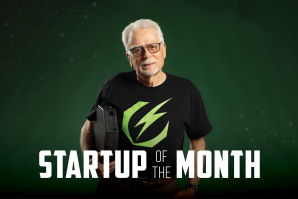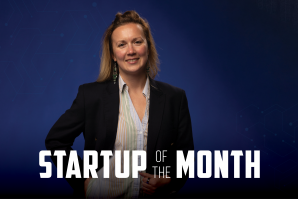Shely Aronov went from a marine construction company that built a sewage system for the city of Cartagena, Colombia, to a clean-label hummus brand. For her third business, she wanted to “make a difference,” she says, so she turned to agriculture. In 2017, she discovered a plant biosensor that could help farmers detect crop diseases early, before they spread and impacted the harvest.
“In the beginning, I was still in Israel, studying this technology, and I went out to talk to grape growers and tomato growers,” says Aronov, co-founder and CEO of Davis-based ag tech startup InnerPlant, “and the reaction from everyone was, ‘Yes, we know plants hold all the knowledge, so it doesn’t surprise us that if we can unlock that information, it would be very valuable.’”
InnerPlant develops seed technology that turns crops into living sensors that detect stress (such as fungus, pathogens and nitrogen deficiency) at the molecular level before visible symptoms appear. The startup’s initial focus is a soybean engineered to emit a fluorescent optical signal within 48 hours of fungal infection.
Its first product, CropVoice, analyzes data from sentinel plots of these soybeans, along with weather and pathogen readings, to give farmers the earliest possible warning of an outbreak. The team decided to target fungus first, which is the hardest stress because fungus is invisible. It’s also binary, Aronov says.
“With fungus, if you have it, you want to get rid of it,” she says. “About 15 percent (of U.S. soybeans) are lost to fungus. It’s just a huge economic problem, so we knew there was a lot of opportunity there.”
Co-founder Rod Kumimoto is a plant molecular biologist with a career in environmental stress responses. To make adoption easy for farmers, the team chose a simple solution: remote, passive detection using satellites. Given its vast acreage of soybeans, the Midwest was an ideal region for InnerPlant to begin deploying its product.
The technology caught the attention of Brandon Hunnicutt, a fifth-generation Nebraska farmer. His family has been on the land for nearly 125 years. Working with his father and brother, they grow varieties of corn, including popcorn, and soybeans. After graduating from the University of Nebraska-Lincoln, he returned to the farm, pushing for more cutting-edge solutions.
“It wasn’t that my dad and grandpa weren’t innovative,” he says, “but when I came back was the beginning stages of the tech revolution: GPS, autosteer, yield mapping. Since I really enjoy that stuff, we’ll keep trying things.”
When it comes to yield loss, they’ve tried various strategies, from spraying fungicide after symptoms appear to planting disease-resistant soybean varieties. But the reality is, most of these methods are reactive, trying to address problems after the damage has been done.
“Once we see it,” he says, “we’re already behind.”
As a result, yield losses can still be massive, he says, sometimes up to 50 percent, or $350 an acre. Even an 8 percent loss across a field amounts to $50 an acre, which adds up fast.
This summer, Hunnicutt is testing out InnerPlant’s sentinel plot. If an engineered soybean plant can signal illness two weeks before symptoms are visible to the naked eye, the field can be treated sooner, saving both yield and money.
“This is just the next stage in the evolution of farm technology,” he says. “This has the potential to be a game changer in the future. It builds on technology we’re already using, like satellites and sensors on sprayers or pivots, and fits into what’s already here.”
Since 2019, InnerPlant has done four rounds of funding, with its Series A led by John Deere and Series B led by farmers. To date, Aronov says, the startup has raised more than $54 million.
The biggest challenge now is just waiting for the season to start. “You have to prepare for nine months, then you launch into your season and you get one take at it, and you can’t really change things live in season,” she says. “I think the hardest thing about agriculture is that seasonality.”
–
Stay up to date on innovation in the Capital Region: Subscribe to the Comstock’s newsletter today!
Recommended For You

Startup of the Month: CREE8
A ‘studio in the cloud’ connects creatives worldwide
“I wanted to build a platform that removed those barriers,” says Lisa M. Watts, CEO and founder of CREE8, “enabling creators to work from anywhere with the same power as an enterprise-grade studio. Truly reinventing the future of work.”

Startup of the Month: Off The Wall Energy
Energy device puts power usage in consumers’ hands
With a family of six, Bob Guimarin had three “power problems”: 1) too many cords, 2) too many outages and 3) not enough ports in the van during road trips. Being a serial entrepreneur, Guimarin came up with a way to simplify power management and reduce reliance on external sources.

Startup of the Month: Elve
High-powered amplifiers aim to boost connectivity
Back in 2019, Diana Gamzina presented her powerful amplifiers at a space agency. The feedback was direct: At about $1 million per device, they were just too expensive for real-world infrastructure. It was a hard truth, but instead of giving up, she doubled down.

Startup of the Month: Alter Learning
STEAM games designed to make education fun for kids
As an Albanian immigrant who grew up poor, Aldi Agaj dreamed for his children to have the access and opportunities he didn’t have. When his daughter was 4, he had an idea to create an edtech company that gives kids free access to innovative games.



